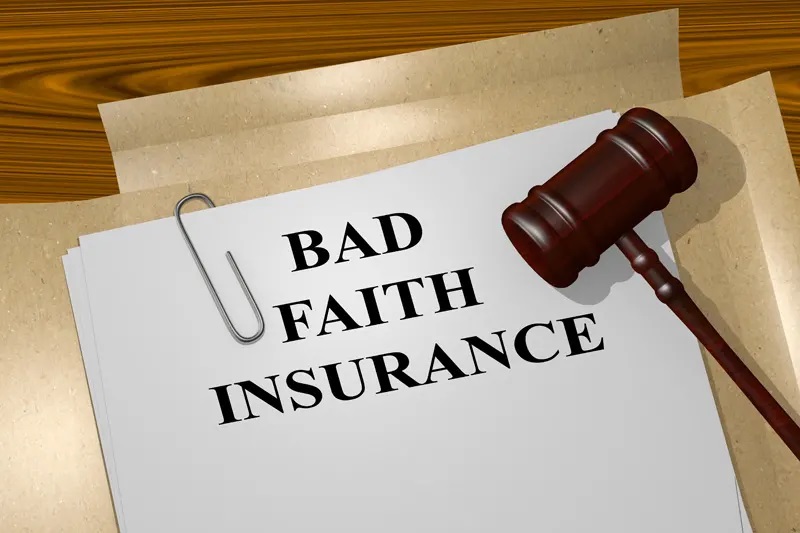Insurance, whether it’s for your car, home, or life, is designed to protect you when you need it most. Regrettably, insurance companies often fail in their primary role by not paying out on valid claims. If your insurer fails to hold up their end of the bargain by honoring your claim, you might be the victim of bad faith insurance.
Bad faith insurance claims can happen to anyone. In fact, there are even Denver law firms that specialize in bad faith insurance cases. These attorneys know the ins and outs of the insurance industry and can help you understand more about your individual case.
Here, we break down bad faith insurance, provide a few examples, and review some important questions to ask your lawyer if you think you might be the victim of bad faith from your insurance company.
WHAT IS BAD FAITH INSURANCE?
Bad faith insurance occurs when an insurance company breaches its policy agreement. When you sign up for an insurance policy (whether it’s for your car, house, or life), you’re actually entering into a legal contract with that company. This agreement ensures you will pay for your policy and that the insurance company will honor and pay out any valid claim. Like any contract, it works both ways.
It seems simple, right? But this isn’t always how things work out. For anyone who knows how insurance companies work, they know that these giant corporations don’t make profits by paying out on claims.
While insurance is designed to protect your interests, insurance companies are still for-profit companies – meaning they’re trying to make money. The most effective way for these companies to make money is by minimizing their payouts and refusing claims.
Bad faith law is designed to protect you when your insurance company refuses to honor their agreement. When your insurance company refuses to pay out on a covered loss, refuses to pay the full amount, delays payment, or simply makes the process too lengthy or complex, you may want to reach out to a bad faith insurance attorney.
WHAT ARE SOME EXAMPLES OF BAD FAITH INSURANCE?
Bad faith insurance can be difficult to identify because not every claim that gets denied is actually done in bad faith. Many claims are denied by insurance companies for perfectly valid reasons, which is why it’s important to carefully read and understand your insurance contract. However, there are still many cases where an insurer fails to pay, or pay fully, on a valid claim. Below are a few examples of what bad faith insurance looks like. If any of these cases sound familiar, reach out to a bad faith insurance attorney immediately.
- Denying a valid claim
- Failing to pay the full amount of a valid claim
- Excessively delaying the processing or paying out on a valid claim
- Failing to conduct an appropriate investigation
- Changing or canceling a policy without justification
- Making unreasonable demands or requirements for processing a valid claim
- Failing to properly communicate with you concerning a valid claim
HOW DO I PROVE BAD FAITH INSURANCE?
If you hope to successfully pursue a bad faith insurance claim, you’ll need proof. Be sure to document any and all communications you’ve had with your insurance company. You also want to have access to the original contract so you can highlight where, based on the text, the insurer broke the agreement and acted in bad faith. If you can, make copies of all your communications and back up this information through e-mail, a hard drive, or physical copies (or all of the above). This evidence will be critical to proving a bad faith insurance claim.
WHAT TYPES OF DAMAGES CAN I RECOVER FROM A BAD FAITH INSURANCE CLAIM?
If you are the victim of bad faith insurance, your insurance provider may be required to pay out on various types of damages beyond the original claim. Some of these additional damages may include:
-
Attorney Fees
If your claim is successful, your insurance provider may be required to pay full or partial legal fees for your case.
-
Punitive Damages
If a judge determines that your insurer caused excessive harm, you may receive additional payment for punitive damages.
-
Emotional Distress
Experiencing any type of lawsuit can be confusing, time-consuming, and stressful; therefore, a court may find that you’re entitled to emotional distress damages.
-
Statutory Penalties
A statutory violation occurs when a defendant knowingly violates a law or regulation. Often, in bad faith insurance suits, this is the case and you may be able to receive additional payment for statutory penalties.
WHAT DO I DO IF I THINK MY INSURER ACTED IN BAD FAITH?
If you believe that your insurer has acted in bad faith by not fulfilling their commitment on a valid claim, you need to reach out to an experienced Denver bad faith insurance attorney. A bad faith insurance lawyer can examine your claim to see if you’re entitled to some form of compensation.
Insurance companies have teams of professionals trained to fight these claims and save the company money. They know these contracts inside and out—which is why you need someone on your side. A bad faith insurance attorney can provide guidance, and if you have a claim, ensure you receive compensation.
CONCLUSION – BAD FAITH INSURANCE
It’s the legal responsibility of your insurer to fulfill their end of the insurance contract by paying out on any valid claim. If your insurance company fails to pay or only partially pays on a valid claim, you may be the victim of bad faith insurance. Be sure to understand your insurance contract to determine whether or not your insurer is, in fact, acting in bad faith. You’ve been faithfully honoring your end of the agreement by making monthly payments—if an accident does occur, your insurer must honor their end.

